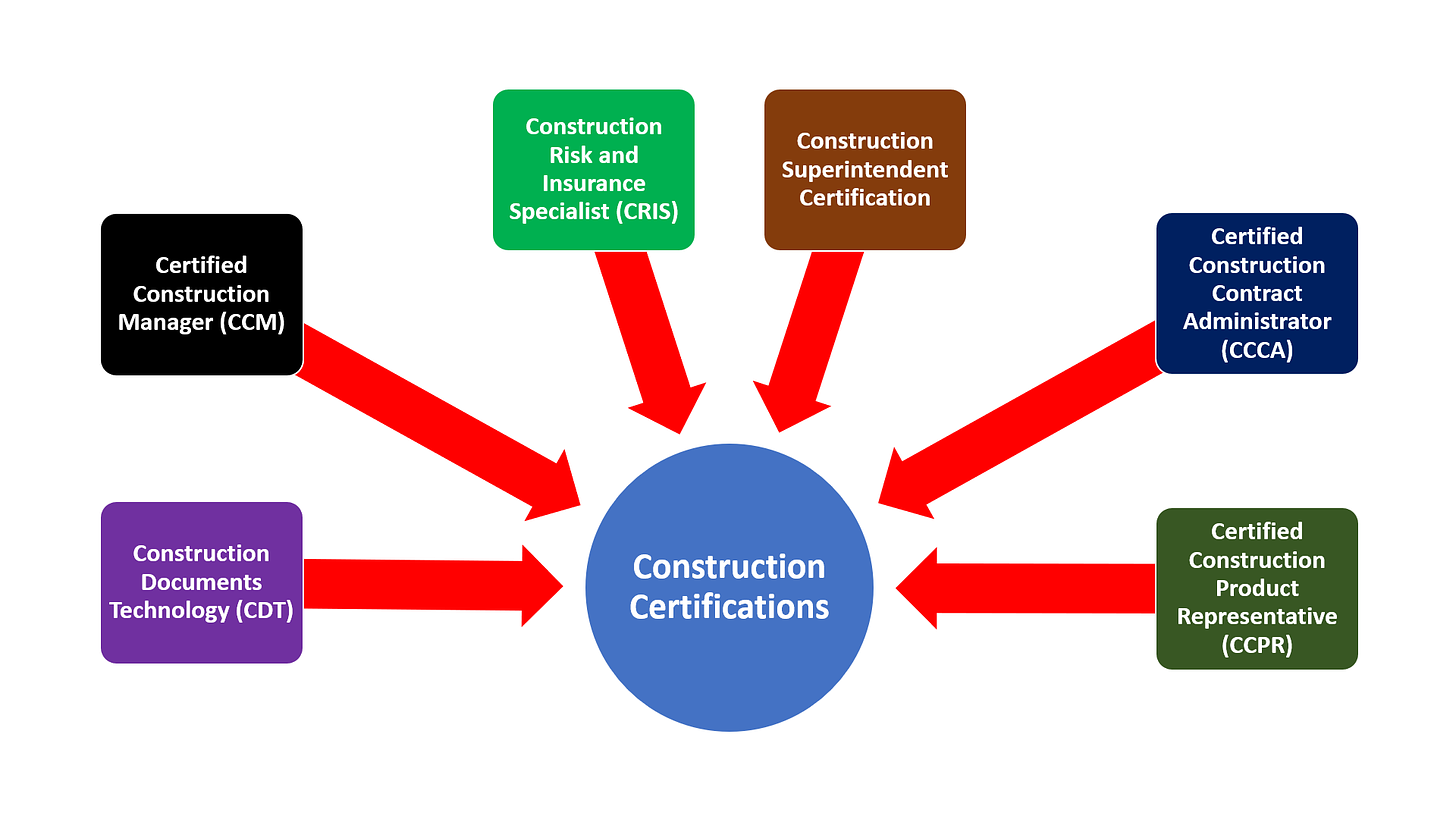Construction Certifications and Industry Outlook
Industry-Based Requirements and Career Transitions
The 2022 Engineering and Construction Industry Outlook published by Deloitte provides numerous insights on trends in the Construction industry. In the previous issue, we had reviewed Technology Certifications in various industries. Connected Construction Technologies can help bring assets, people, processes, and job sites onto one platform, and consequently reduce downtime and optimize asset utilization. The term “connected construction” is defined by Deloitte as “an ecosystem of connected job sites, machines, and workers, that enhances operational effectiveness and safety.” In this issue, we will review some of the major certifications related to construction, that individuals can earn.
A certification that individuals with no experience can earn, is the Construction Documents Technology (CDT) certification. This certification prepares candidates to write, interpret, enforce and manage construction documents. This certification is intended for contractors, contract administrators, material suppliers, manufacturers’ representatives and project architects. The curriculum covers eight knowledge domains. These include Fundamentals such as the four project teams and stages of the facility life cycle. These domains also include Project Conception and Delivery as well as the Design Process, Further, the domains cover Construction Documents, Procurement and Preconstruction. Finally, the domains include Construction Execution and Life Cycle Activities. Candidates must pass a 2-hour, 120 multiple-choice questions exam.
A certification that individuals with experience can earn, is the Certified Construction Manager certification. Construction Managers apply talent, technology and a variety of tools to successfully complete construction projects. The Construction Management Association of America, notes, that the Certified Construction Manager is a communicator, a facilitator, a problem solver and a professional leader. To be eligible, a candidate must have 48 non-overlapping months of experience, of being responsible-in-charge. The candidates must demonstrate direct responsibility for the supervision of the Construction Management staff. The candidates must also demonstrate strong communication and coordination skills. Construction Managers coordinate with various parties such as suppliers, vendors, and contractors. There is a rigorous application review and acceptance process. Once a candidate is accepted, he or she must pass an examination. The examination includes 175 questions but only 150 are scored. The examination tests general knowledge of design and construction management, and candidates must achieve a score of 72% or higher to pass.
A third certification that insurance agents, brokers, and in-house risk managers or insurance buyers can earn is the Construction Risk and Insurance Specialist (CRIS) certification. Candidates gain specialized knowledge in construction insurance and risk management. There are five required courses, that candidates for the certification, need to take. The Commercial Auto, Surety, Controlled Insurance Programs, and Miscellaneous Lines course covers topics such as professional liability and fiduciary liability among others. The Commercial Liability Insurance for Contractors course covers the major categories of insurance liability and different coverage triggers among other topics. The Contractual Risk Transfer in Construction course covers problematic construction contract provisions. The course also covers gaps between a contractor’s contractually assumed liabilities and its contractual liability insurance coverage, among other topics. The Property Insurance for Contractors course covers different types of property insurance policies. The Workers Compensation for Contractors course covers employers’ liability insurance.
A fourth certification is the Construction Superintendent Certification program. It has been estimated that it takes about nine to twelve years to go from entry-level to highly experienced professionals. This certification has been developed to increase the ranks of qualified construction superintendent professionals. To obtain this certification, candidates must complete and pass a Construction Superintendent Assessment and the FMI Field Leadership Institute program.
There are other entry-level certifications as well. If you are considering a role in the construction industry, you may want to consider earning these credentials.



